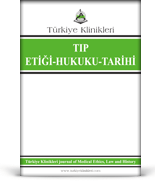Objective: This study was conducted in order to determine the intercultural sensitivity levels of nurses and influencing factors. Material and Methods: This research is a comparative descriptive study. The study was conducted in Turkey between March 2014 and June 2014. Written permissions were obtained from local ethics committee of İstanbul Faculty of Medicine, Turkey. The population and sample of the study were comprised nurses (n=246) working in a university hospital. Data were collected using a Personal Data Form and the Intercultural Sensitivity Scale. Results: The average total score of the Intercultural Sensitivity Scale of nurses was 86.23±9.80 (min=64, max=116), and the level of sensitivity was moderate. The average total scores from subscales of responsibility in interaction, respect for cultural differences, self- confidence in interaction, enjoying interaction, and attention in interaction were 25.89±3.28 (min=16, max=35), 22.61±3.32 (min=14, max=30), 16.29±3.31 (min=8, max=25), 10.86±2.15 (min=3, max=15), and 10.58±1.73 (min=3, max=15), respectively. There were statistically significant differences between sex, marital status, employment duration at the institution, level of education, being with other people from different cultures, knowing a foreign language, and intercultural sensitivity levels (p< 0.05). Conclusion: Intercultural sensitivity levels of nurses in communication with individuals from different cultures are important. It is important that those working in healthcare institutions, to which people from different cultures increasingly present to receive healthcare, know the language of their patients. For this reason, teaching different cultural languages can be recommended to increase intercultural sensitivity.
Keywords: Culture; interpersonal relations; nursing
Amaç: Bu çalışma, hemşirelerin kültürlerarası duyarlılık düzeylerini ve etkileyen faktörleri belirlemek amacı ile gerçekleştirildi. Gereç ve Yöntemler: Bu araştırma, karşılaştırmalı tanımlayıcı bir çalışmadır. Çalışma Türkiye'de Mart 2014-Haziran 2014 tarihleri arasında gerçekleştirildi. Yazılı izinler, tıp fakültesi hastanesinin yerel etik kurulundan (İstanbul Tıp Fakültesi, Türkiye) alındı. Araştırmanın evren ve örneklemini bir üniversite hastanesinde çalışan hemşireler (n=246) oluşturdu. Veriler 'Kişisel Bilgi Formu' ve 'Kültürlerarası Duyarlılık Ölçeği' kullanılarak toplandı. Bulgular: Kültürlerarası Duyarlılık Ölçeği (KDÖ)'nin ortalama toplam puanı 86,23±9,80 (min=64, max=116) ve duyarlılık düzeyi orta düzeyde idi. KDÖ'nün iletişimde sorumluluk, kültürel farklılıklara saygı, iletişimde kendine güvenme, iletişimden hoşlanma, iletişimde dikkatli olma alt ölçek toplam puan ortalamaları sırasıyla; 25,89±3,28 (min=16, max=35), 22,61±3,32 (min=14, max=30), 16,29±3,31 (min=8, max=25), 10,86±2,15 (min=3, max=15), ve 10,58±1,73 (min=3, max=15)'tür. Cinsiyet, medeni durum, kurumda çalışma süresi, eğitim düzeyi, farklı kültürden insanlarla birlikte olmak ve yabancı dil bilmek ile kültürlerarası duyarlılık düzeyi arasında istatistiksel olarak anlamlı farklılıklar bulundu (p< 0,05). Sonuç: Farklı kültürden gelen insanların sağlık bakımı gereksinimlerinin arttığı sağlık kurumlarında çalışanların bu kültürdeki insanların dilini bilmeleri önemlidir. Bu nedenle kültürlerarası duyarlılığı arttırmak için farklı kültürel dillerin eğitimi önerilebilir.
Anahtar Kelimeler: Kültür; kişilerarası ilişkiler; hemşirelik
- Roper N, Logan WW, Tierney AJ. The Roper-Logan-Tierney Model of Nursing: Based on activities of living. 1st ed. Edinburgh: Elsevier Health Sciences; 2000. p.8-120.
- Gümüş Y, Bilgili N. [Effect of the immigration on health]. Anadolu Hemşirelik ve Sağlık Bilimleri Dergisi. 2015;18(1):63-7.
- Alexis O. Health and cultural sensitivity in a diversifying society. British Journal of Healthcare Assistants. 2011;5(6):297-8. [Crossref]
- Hart PL, Mareno N. Cultural challenges and barriers through the voices of nurses. J Clin Nurs. 2013;23(15-16):2223-32. [Crossref] [PubMed]
- Chang HY, Yang YM, Kuo YL. Cultural sensitivity and related factors among community health nurses. J Nurs Res. 2013;21(1):67-73. [Crossref] [PubMed]
- Lin HC. Impact of nurses' cross-cultural competence on nursing intellectual capital from a social cognitive theory perspective. J Adv Nurs. 2016;72(5):1144-54. [Crossref] [PubMed]
- Norton D, Marks-Maran D. Developing cultural sensitivity and awareness in nursing overseas. Nurs Stand. 2014;28(44):39-43. [Crossref] [PubMed]
- Bock GL. Cultural sensitivity in paediatrics. J Med Ethics. 2013;39(9):579-81. [Crossref] [PubMed]
- Foronda CL. A concept analysis of cultural sensitivity. J Transcult Nurs. 2008;19(3):207-12. [Crossref] [PubMed]
- Bulduk S, Usta E, Dinçer Y. Determination of intercultural sensitivity and influencing factors: an example of vocational school of health. J DU Health Sci Inst. 2017;7(2):73-7.
- Egelioğlu Cetişli N, Işık G, Özgüven Öztornacı B, Ardahan E, Özgürsoy Uran BN, Top ED, et al. [Intercultural sensitivity of nursing students according to their empathy level]. İzmir Kâtip Çelebi Üniversitesi Sağlık Bilimleri Fakültesi Dergisi. 2016;1(1):27-33.
- Plaza del Pino FJ, Soriano E, Higginbottom GMA. Sociocultural and linguistic boundaries influencing intercultural communication between nurses and Moroccan patients in southern Spain: a focused ethnography. BMC Nurs. 2013;12(14):1-8. [Crossref] [PubMed] [PMC]
- Uzun Ö, Sevinç S. The relationship between cultural sensitivity and perceived stress among nurses working with foreign patients. J Clin Nurs. 2015;24(23-24):3400-8. [Crossref] [PubMed]
- Yilmaz M, Toksoy S, Denizci Direk Z, Bezirgan S, Boylu M. Cultural sensitivity among clinical nurses: a descriptive study. J Nurs Scholarsh. 2017;49(2):153-61. [Crossref] [PubMed]
- Simsek H, Erkin O, Bayik Temel A. Cultural sensitivity and related factors among nurse educators in Turkey. International Journal of Caring Sciences. 2017;10(3):1374-81.
- Meydanlioğlu A, Arikan F, Gözüm S. Cultural sensitivity levels of university students receiving education in health disciplines. Adv Health Sci Educ Theory Pract. 2015;20(5):1195-204. [Crossref] [PubMed]
- Chen GM, Starosta WJ. The development and validation of the intercultural sensitivity scale. Human Communication. 2000;3(1):1-15. [Crossref]
- Bulduk S, Tosun H, Ardıç E. [Measurement properties of Turkish intercultural sensitivity scale among nursing students]. Turkiye Klinikleri J Med Ethics. 2011;19(1):25-31.
- Kılıç S. [Cronbachs alpha reliability coefficient]. Journal of Mood Disorder. 2016;6(1):47-8. [Crossref]
- Yaman Aktaş Y, Gök Uğur H, Orak OS. [Investigation of the opinions of nurses concerning the transcultural nursing care]. Uluslararası Hakemli Hemşirelik Araştırmaları Dergisi. 2016;8:120-35. [Crossref]
- Temel Eğinli A, Yalçın M. [Developing intercultural competence and intercultural adjustment]. Global Media Journal TR Edition. 2016;7:6-27.
- Gündüz M. Analysing language classrooms through classroom interaction. Journal of Human Sciences. 2014;11(2):1149-66. [Crossref]
- Suk MH, Oh WO, Im YJ, Cao HH. Mediating effect of school nurses' self efficacy between multicultural attitude and cultural sensitivity in korean elementary schools. Asian Nurs Res. 2015;9:194-9. [Crossref] [PubMed]
- Rengi Ö, Polat S. [Primary teachers' perception of cultural diversity and intercultural sensitivity]. Zeitschrift für die Welt der Türken Journal of World of Turks. 2014;6:135-55.
- Çobanoğlu N. [Migration and health in terms of medical ethics]. Ekonometri. 2016;12(80):52-7.
- Çobanoğlu N. Kuramsal ve Uygulamalı Tıp Etiği. 1. Baskı. Ankara: Efil Yayınevi; 2009. p.8-20.







.: İşlem Listesi